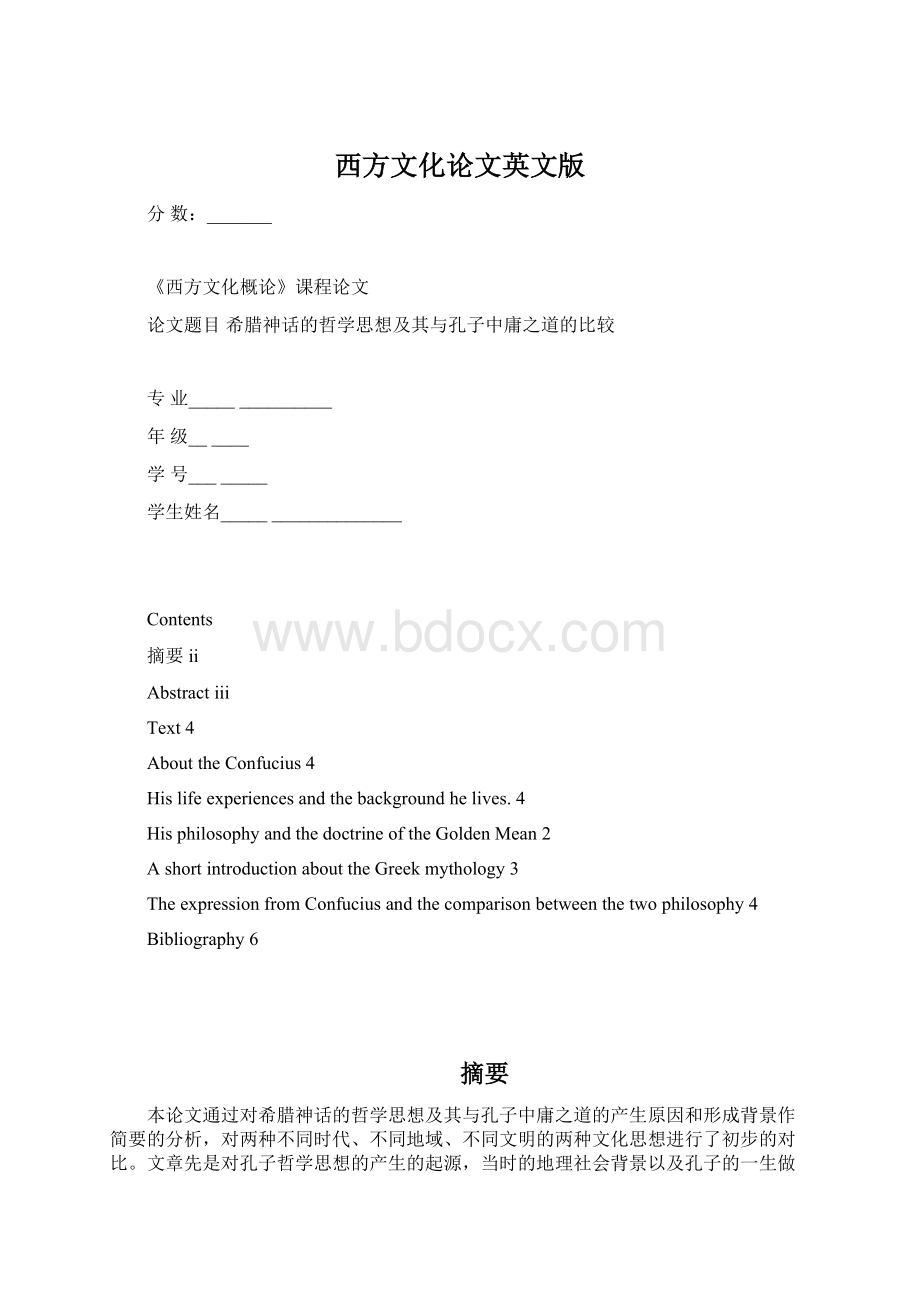西方文化论文英文版.docx
《西方文化论文英文版.docx》由会员分享,可在线阅读,更多相关《西方文化论文英文版.docx(6页珍藏版)》请在冰豆网上搜索。

西方文化论文英文版
分数:
_______
《西方文化概论》课程论文
论文题目希腊神话的哲学思想及其与孔子中庸之道的比较
专业_______________
年级______
学号________
学生姓名___________________
Contents
摘要ii
Abstractiii
Text4
AbouttheConfucius4
Hislifeexperiencesandthebackgroundhelives.4
HisphilosophyandthedoctrineoftheGoldenMean2
AshortintroductionabouttheGreekmythology3
TheexpressionfromConfuciusandthecomparisonbetweenthetwophilosophy4
Bibliography6
摘要
本论文通过对希腊神话的哲学思想及其与孔子中庸之道的产生原因和形成背景作简要的分析,对两种不同时代、不同地域、不同文明的两种文化思想进行了初步的对比。
文章先是对孔子哲学思想的产生的起源,当时的地理社会背景以及孔子的一生做了简要的介绍,并举例介绍孔子中庸思想的具体表现,让读者对孔子和中庸有一个比较熟悉的初步印象。
随即对希腊神话的产生、发展做简单提要(因为课堂上已讲了许多不做详述)分析其这哲学思想的体现,价值观和人生观、审美态度等进行浅析,进而对两中伟大的思想文明进行对比。
关键词:
孔子众神文化奥林匹克精神中庸。
Abstract
ThisthesisisgenerallyabouttheintroductionsandthecomparisonsbetweenthephilosophyoftheGreekmythologyandthemiddlebrowfromtheConfucius.Firstly,thethesiswillgiveabriefintroductionaboutthemiddlebrowphilosophy,itssocialbackground,andtheConfucius’swholelife.TellthereaderswhydoesthethemiddlebrowphilosophycomeintobeingandgivethedetailedexpressionaboutitfromConfucius’ssaying.ThenintroducethephilosophyoftheancientGreek,itsstories,andshowhowthephilosophycomeintobeinganddevelops,analyzingtheembodimentofitsvalue,esthetics.Atthesametime,docomparisonsbetweenthephilosophyoftheGreekmythologyandthemiddlebrowfromtheConfuciuswhichcomesfromthedifferenttimes,areas,andcivilizations.MoreemphasizeswillbefocusedonthemiddlebrowfromtheConfuciusandConfuciushimself,becausewehavelearnalotabouttheancientGreekfromtheclassandthemiddlebrowandtheConfuciusarehardtounderstand.
Keywords:
Confucius;thespiritsofthegods;theOlympicspirit;middlebrow.
Text
AbouttheConfucius
Hislifeexperiencesandthebackgroundhelives.
Confucius(bornKongQiu,styledZhongNi)wasborninthevillageofZouinthecountryofLuin551B.C.,apoordescendantofadeposednoblefamily.Asachild,heheldmake-believetemplerituals;asayoungadult,hequicklyearnedareputationforfairness,politenessandloveoflearning,andhewasreputedtobequitetall.Hetraveledextensivelyandstudiedattheimperialcapital,Zhou,whereheissaidtohavemetandspokewithLaoZi,thefounderofDaoism.
UponhisreturntoLu,hegainedrenownasateacher,butwhenhewas35,DukeZhaoofLuledhiscountrytowar,wasroutedandfledtotheneighboringcountryofQi;inthedisorderfollowingthebattle,Confuciusfollowed.DukeZhaofrequentlycametohimforadvice,butuponcounselofoneofhisministers,hedecidedagainstgrantinglandtoConfuciusandgraduallystoppedseekinghiscounsel.WhenothernoblesbeganplottingagainstConfucius'position,DukeZhaorefusedtointervene,andConfuciusreturnedtoLu.Butconditionstherewerenobetterthanbefore,andConfuciusretiredfrompubliclifetoconcentrateonteachingandstudying.
Atage50,hewasapproachedbytheBaronofQitohelpdefendagainstarebellion,buthedeclined.HewaslatermadeacitymagistratebythenewDukeofLu,andunderhisadministrationthecityflourished;hewaspromotedseveraltimes,eventuallybecomingGrandSecretaryofJusticeand,atage56,ChiefMinisterofLu.NeighboringcountriesbegantoworrythatLuwouldbecometoopowerful,andtheysentmessengerswithgiftsanddancerstodistractthedukeduringasacrificeholiday.Whenthedukeabandonedhisdutiestoreceivethemessengers,Confuciusresignedandleftthecountry.
ConfuciusspentthenextfiveyearswanderingChinawithhisdisciples,findingthathispresenceatroyalcourtswasrarelytoleratedforlongbeforenobleswouldbeginplottingtodrivehimoutorhavehimkilled.Hewasarrestedonceandjailedforfivedays,andat62hewaspursued,alongwithhisdisciples,intothecountrysidebyabandofsoldierssentbyjealousnobles,untilhewasabletosendamessengertothesympathetickingofanearbycountry,whosenthisownsoldierstorescuethem.Onceagain,Confuciuswastobegivenlandbutwasdeniedituponcounselofanotherhighminister.Afterfurtherwanderings,heeventuallyreturnedtoLuatage67.Althoughhewaswelcomedthereandchosetoremain,hewasnotofferedpublicofficeagain,nordidheseekit.Insteadhespenttherestofhisyearsteachingand,finally,writing.Hediedat72.
HisphilosophyandthedoctrineoftheGoldenMean
AlthoughConfucianismisoftenfollowedinareligiousmannerbytheChinese,argumentscontinueoverwhetheritisareligion.Confucianismlacksanafterlife,itstextsexpresscomplexandambivalentviewsconcerningdeities,anditisrelativelyunconcernedwithsomespiritualmattersoftenconsideredessentialtoreligiousthought,suchasthenatureofthesoul.
Confucius'principlesgainedwideacceptanceprimarilybecauseoftheirbasisincommonChinesetraditionandbelief.Hechampionedstrongfamilialloyalty,ancestorworship,respectofeldersbytheirchildren(and,accordingtolaterinterpreters,ofhusbandsbytheirwives),andthefamilyasabasisforanidealgovernment.Heexpressedthewell-knownprinciple,"Donotdotootherswhatyoudonotwantdonetoyourself"(similartotheGoldenRule).Healsolookednostalgicallyuponearlierdays,andurgedtheChinese,particularlythosewithpoliticalpower,tomodelthemselvesonearlierexamples.
BecausenotextssurvivethataredemonstrablyauthoredbyConfucius,andtheideasassociatedwithhimmostcloselywereelaboratedinwritingsthataccruedovertheperiodbetweenhisdeathandthefoundationofthefirstChineseempirein221BC,manyscholarsareverycautiousaboutattributingspecificassertionstoConfuciushimself.
TheConfuciantheoryofethicsasexemplifiedinLǐisbasedonthreeimportantconceptualaspectsoflife:
ceremoniesassociatedwithsacrificetoancestorsanddeitiesofvarioustypes,socialandpoliticalinstitutions,andtheetiquetteofdailybehavior.Itwasbelievedbysomethatlǐoriginatedfromtheheavens.Confucius'sviewwasmorenuanced.Hisapproachstressedthedevelopmentoflǐthroughtheactionsofsageleadersinhumanhistory,withlessemphasisonitsconnectionwithheaven.Hisdiscussionsoflǐseemtoredefinethetermtorefertoallactionscommittedbyapersontobuildtheidealsociety,ratherthanthosesimplyconformingwithcanonicalstandardsofceremony.IntheearlyConfuciantradition,lǐ,thoughstilllinkedtotraditionalformsofaction,cametopointtowardsthebalancebetweenmaintainingthesenormssoastoperpetuateanethicalsocialfabric,andviolatingtheminordertoaccomplishethicalgood.Theseconceptsareaboutdoingtheproperthingatthepropertime,andareconnectedtothebeliefthattraininginthelǐthatpastsageshavedevisedcultivatesinpeoplevirtuesthatincludeethicaljudgmentaboutwhenlǐmustbeadaptedinlightofsituationalcontexts.
InearlyConfucianism,yì()andlǐarecloselylinkedterms.Yìcanbetranslatedasrighteousness,thoughitmaysimplymeanwhatisethicallybesttodoinacertaincontext.Thetermcontrastswithactiondoneoutofself-interest.Whilepursuingone'sownself-interestisnotnecessarilybad,onewouldbeabetter,morerighteouspersonifonebasedone'slifeuponfollowingapathdesignedtoenhancethegreatergood,anoutcomeofyì.Thisisdoingtherightthingfortherightreason.Yìisbaseduponreciprocity.
JustasactionaccordingtoLǐshouldbeadaptedtoconformtotheaspirationofadheringtoyì,soyìislinkedtothecorevalueofrén.Rénisthevirtueofperfectlyfulfillingone'sresponsibilitiestowardothers,mostoftentranslatedas"benevolence"or"humaneness";translatorArthurWaleycallsit"Goodness"(withacapitalG),andothertranslationsthathavebeenputforthinclude"authoritativeness"and"selflessness."Confucius'smoralsystemwasbaseduponempathyandunderstandingothers,ratherthandivinelyordainedrules.Todevelopone'sspontaneousresponsesofrénsothatthesecouldguideactionintuitivelywasevenbetterthanlivingbytherulesofyì.Tocultivateone'sattentivenesstorénoneusedanotherConfucianversionoftheGoldenRule:
onemustalwaystreatothersjustasonewouldwantotherstotreatoneself.Virtue,inthisConfucianview,isbaseduponharmonywithotherpeople,producedthroughthistypeofethicalpracticebyagrowingidentificationoftheinterestsofselfandother.
Inthisregard,ConfuciusarticulatedanearlyversionoftheGoldenRule:
"Whatonedoesnotwishforoneself,oneoughtnottodotoanyoneelse;whatonerecognisesasdesirableforoneself,oneoughttobewillingtogranttoothers."
AshortintroductionabouttheGreekmythology
GreekmythologyisthebodyofmythsandlegendsbelongingtotheancientGreeksconcerningtheirgodsandheroes,thenatureoftheworldandtheoriginsandsignificanceoftheirowncultandritualpractices.TheywereapartofreligioninancientGreece.ModernscholarsrefertothemythsandstudytheminanattempttothrowlightonthereligiousandpoliticalinstitutionsofAncientGreeceandontheAncientGreekcivilization,andtogainunderstandingofthenatureofmyth-makingitself.Greekmythologyisembodiedexplicitlyinalargecollectionofnarrativesandimplicitlyinrepresentationalarts,suchasvase-paintingsandvotivegifts.Greekmythexplainstheoriginsoftheworldanddetailsthelivesandadventuresofawidevarietyofgods,goddesses,heroes,heroines,andothermythologicalcreatures.Theseaccountswereinitiallydisseminatedinanoral-poetictradition;theGreekmythsareknowntodayprimarilyfromGreekliterature.TheoldestknownGreeklitera